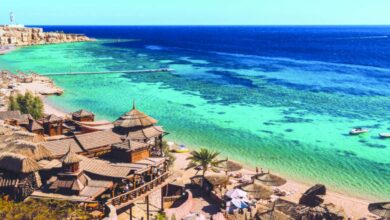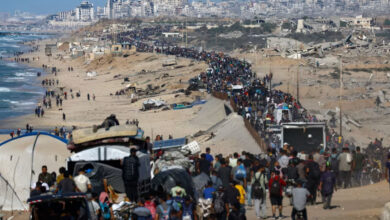The world and Egyptians alike await the trial of former President Hosni Mubarak before the Cairo Criminal Court this Wednesday. Alluding to the advent of Ramadan, the independent daily Al-Tahrir dubbed the trial, "The Deposed: Starring Hosni Mubarak and his sons, Gamal and Alaa.”
The former president stands accused of three crimes: involvement in the killing of protesters during the revolution; impropriety in the sale of five villas, together worth almost LE40 million, in a deal involving Hussein Salem (currently being held in Spain); and corruption in gas sales to Israel, charges for which former Petroleum Minister Sameh Fahmi is currently being tried.
While various security arrangements have been made to prepare for the hearing in Cairo, questions are being raised as to whether Mubarak will really make a public appearance at court.
Newspapers reported Sunday that the Mubarak juniors, together with former Interior Minister Habib al-Adly and his assistants, will be taken to court from Tora prison in a convoy of armored military vehicles.
The senior Mubarak, on the other hand, is scheduled to be flown to the site of the academy, which was previously known as Mubarak Academy. He is expected to be transferred on a bed, which will be placed in the defendant's dock.
The ex-president was taken to Sharm el-Sheikh International Hospital shortly after his resignation and remains there, in pre-trial police custody.
State media describes Mubarak as suffering from “severe depression,” and last week rumors began circulating that he was refusing to eat. The public prosecutor has nonetheless ordered that he appear in court.
“Mubarak’s health condition allows for his transfer to Cairo,” Health Minister Amr Helmy told Al-Masry Al-Youm. He added that the ministry remains committed to supporting the Interior Ministry in providing any needed health assistance to the former president during the trial.
Mohamed Naguib, head of the South Sinai Security Directorate, said he received the prosecution order to summon Mubarak to court, but it has not been decided yet when exactly he will be transferred.
Sayed Fathy, an attorney and member of the Egyptian Front for the Defense of Protesters, is attending the trial as a representative of the civil suit being lodged against Mubarak.
He explained that even if the forensic medicine chief states that a defendant is well enough to stand trial, his defense can submit medical evidence contradicting the claim. The court has complete discretion over which report to believe.
Fathy worries about the speed at which the case has been prepared, which may undermine the charges brought against Mubarak and any eventual conviction.
He anticipates that the opening session of the trial will be short and procedural, and that Mubarak's defense team will exercise its right to demand an adjournment.
Judge Ahmed Refaat, who will hear the case, indicated during a press conference on Sunday that the court will remain in session and hear the case until its conclusion, rather than adjourning for up to a month after the first session, as is usual with criminal cases.
The Police Academy was chosen to host the trial because of its relatively remote location on the Cairo Ring Road. The Cairo Exhibition Grounds, which had originally been selected as the venue, posed a security nightmare because of its central location and accessibility.
Where a case is heard is decided by the area in which the crime took place and the defendant's place of residence, although the justice minister has the power to move it to a different location altogether, as happened with the trial of defendants accused of the 2004 Taba bombings that was heard in Ismailia.
Preparations are still ongoing in the academy; a 30-meter iron cage is being built to receive Mubarak and the other defendants in the hall, which will host 600 lawyers, victims' relatives and members of the press.
Adly's portrait has been removed from the Police Academy. Attendees are required to receive accreditation from Refaat, who has vowed to do everything in his power to make sure the hearing stays safe.
In the meantime, the Interior Ministry is collaborating with the armed forces to secure the area and the hearing on Wednesday.




